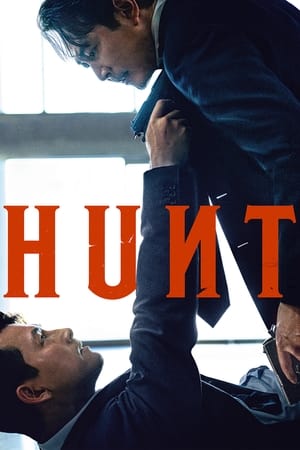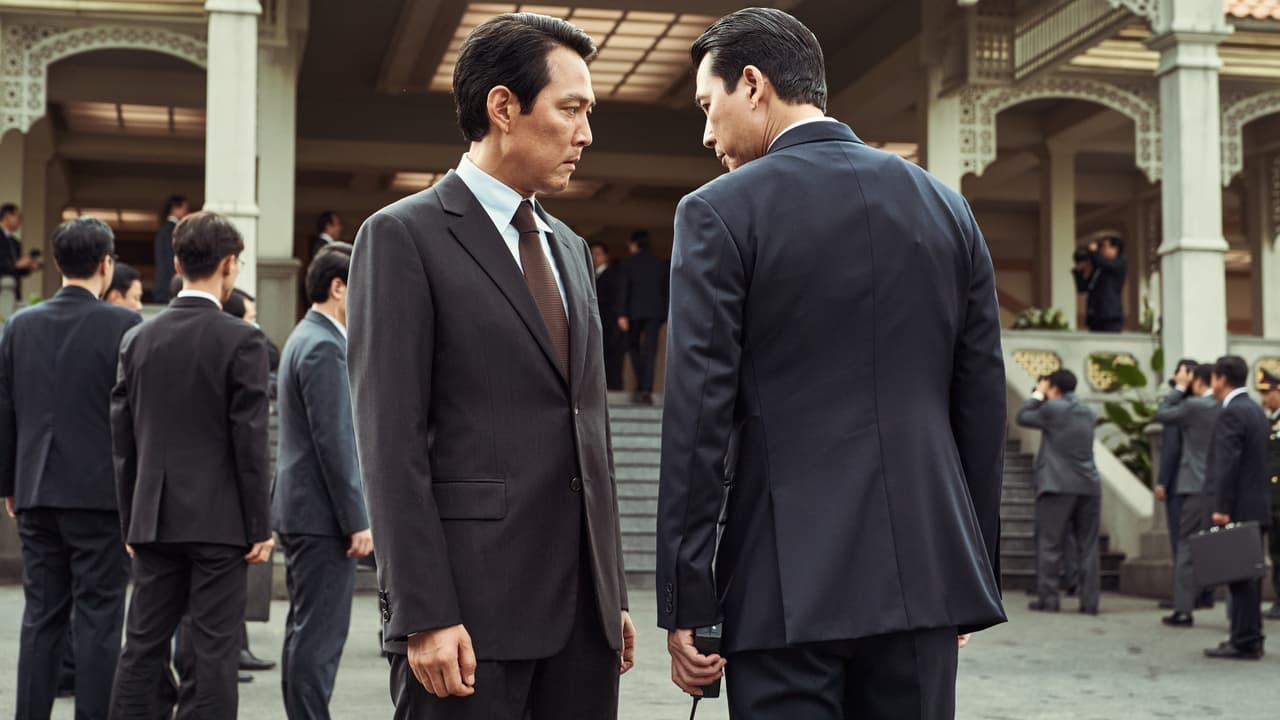
Generally speaking, I prefer to watch films with as little foreknowledge as possible. Don’t seek out trailers, don’t browse movie-news sites; if I’m reading someone else’s review, it’s because I’ve either seen the movie or have pretty firmly decided that I’d rather not. There are many advantages to this approach—the joy of discovery chief among them—but there’s a downside, too: Now and then, you come across a foreign film for which at least a smidge of contextualization would be enormously helpful.
Such is the case with Hunt, a South Korean political thriller that screened in the midnight section at Cannes earlier this year, where it received some mixed notices from non-Korean critics who confessed that they had considerable trouble following its plot. The version playing in U.S. theaters has reportedly been tweaked since then, with an eye toward helping out viewers unfamiliar with the story’s historical background; the English subtitles, in particular, put in some extra effort, translating a simple bit of onscreen text like “Three years ago, Gwangju” (which a Korean audience watching a film set mostly in 1983 would instantly grasp the significance of) as “Three years ago, military coup d’état and 10-day citizen massacre.” Which is better than nothing, but I’m gonna endeavor to clarify matters as much as possible, so that folks can be properly frustrated by the film’s increasingly ludicrous internecine gamesmanship, rather than merely confused by its allusions to various real-world events.
So: It’s 1983, when South Korea was still a military dictatorship ruled by former army general Chun Doo-hwan, the country’s president (initially “elected” with 99.96% of the vote) throughout most of the ’80s. In real life, Chun was very nearly assassinated that year during a visit to Myanmar—and that’s important to know, because while Hunt’s narrative is almost entirely invented, it both leans heavily upon and actively toys with an ideal viewer’s awareness of what happened back then. In this alternate but closely related universe, a different, fictional assassination attempt (in Washington, D.C.) gets foiled during the movie’s opening sequence, following which the CIA informs its Korean counterpart—actually called the KCIA—that a North Korean mole, code-named Donglim, is in their midst. Unfortunately, the head of the KCIA’s foreign unit, Park Pyong-ho (Squid Game’s Lee Jung-jae), and the head of its domestic unit, Kim Jung-do (Jung Woo-sung, best known to Americans as the first title character in The Good, the Bad, the Weird), despise each other with a passion, and each man quickly focuses his investigation primarily upon the other.
In theory, Park and Kim function as dual protagonists, with our uncertainty about which one of them (if either) is Donglim being part of the fun. If Hunt seems to be weighting our allegiance slightly toward Park, that’s probably because Lee Jung-jae also cowrote and directed the film, moving behind the camera for the first time after nearly 30 years an an actor. (In addition to his role as Player 456 in Squid Game, he played the male lead in Im Sang-soo’s 2010 remake of ‘60s Korean classic The Housemaid.) Most of his starring vehicles haven’t been theatrically released in the U.S., and I have no idea how many of them are action movies, but Hunt strongly suggests that kinetic mayhem is his forte. An early Tokyo-set sequence, in which Park’s attempt to extract a potential North Korean defector spectacularly fails due to various parties’ conflicting directives, becomes a truly galvanizing exercise in chaotic brutality, demonstrating that a judiciously assembled flurry of quick cuts can elevate the pulse and coherently direct the eye. (That’s why you’re somewhat inaccurately called a “director,” Michael Bay. Just FYI.) Whenever cars are speeding and bullets are flying and bodies are dropping, Hunt rivals RRR and Top Gun: Maverick for sheer excitement.
That’s not terribly often, alas. The movie primarily traffics in comparatively low-key spy vs. spy machinations, with the not-entirely-credible wrinkle that both spies are technically working for the same organization and in pursuit of the same goal. (The KCIA’s head honcho seems well aware of, yet strangely untroubled by, Park and Kim’s mutual hostility.) Park starts looking into a dodgy-looking military contractor with a deeply buried connection to Kim—a subplot that never finds its way out of truculent, corrupt murkiness, though not for want of explicit torture scenes. (Both KCIA units are staffed entirely by dudes who make 24’s Jack Bauer look like a human rights activist.) Meanwhile, Kim arrests a young woman (Go Yoon-jung) who we’ve seen treat Park like a father, claiming that she’s been feeding North Korea classified information through Park. That thread never snaps taut, either—partially because Park’s history with the woman gets parceled out piecemeal in flashbacks, partially because the film features competing flashbacks that reveal Kim’s traumatic experience as a soldier three years earlier, in Gwangju.
Which brings us back to South Korean history. Hunt sports a fairly major third-act twist—one that’s only partially comprehensible if you’re unaware that the “three years earlier” flashbacks are rooted in one of the country’s most horrific tragedies/atrocities, in which students demonstrating against the coup d’état that had occurred five months earlier (to simplify matters considerably—there was actually a second coup) were fired upon by soldiers, leading to a full-scale uprising in Gwangju that resulted in hundreds or possibly thousands of deaths, depending upon who’s doing the estimating. Again, there’s a subtitle that tries to provide that background, but it’s hard to process in the moment. And the movie’s entire climax pivots on the aforementioned assassination attempt on Chun, in a way not unlike what Tarantino does with World War II at the end of Inglourious Basterds. I’m not saying that Hunt rewrites history that dramatically, necessarily, but you’re supposed to be aware that what’s happening is both a reflection of and deviation from real-life intrigue. Imagine a movie that stages a potential shooting of JFK in Salt Lake City on September 26, 1963 (he gave a speech there on that date; I looked it up) and you’ll get the idea.
Do I wish that I’d learned all of this before seeing Hunt, rather than immediately afterwards, following a quick skim of some Cannes reviews confirming that I wasn’t alone in my sketchy grasp of what I’d just watched? Indeed I do. But would that have made a notable difference in my overall opinion of a self-serious, often graphically violent film, unmistakably in conversation with actual political and military crimes, that’s also cheesy enough to let multiple dying characters hang on just long enough to choke out significant final words that provide a possible clue to the mole’s identity? I suspect not. For a first-time effort by a popular actor, this is more Grand Theft Auto than Gone Baby Gone. Should Lee try his hand at something less sober and more visceral next time, though, I’ll be first in line.
One of the first notable online film critics, having launched his site The Man Who Viewed Too Much in 1995, Mike D’Angelo has also written professionally for Entertainment Weekly, Time Out New York, The Village Voice, Esquire, Las Vegas Weekly, and The A.V. Club, among other publications. He’s been a member of the New York Film Critics Circle and currently blathers opinions almost daily on Patreon.






